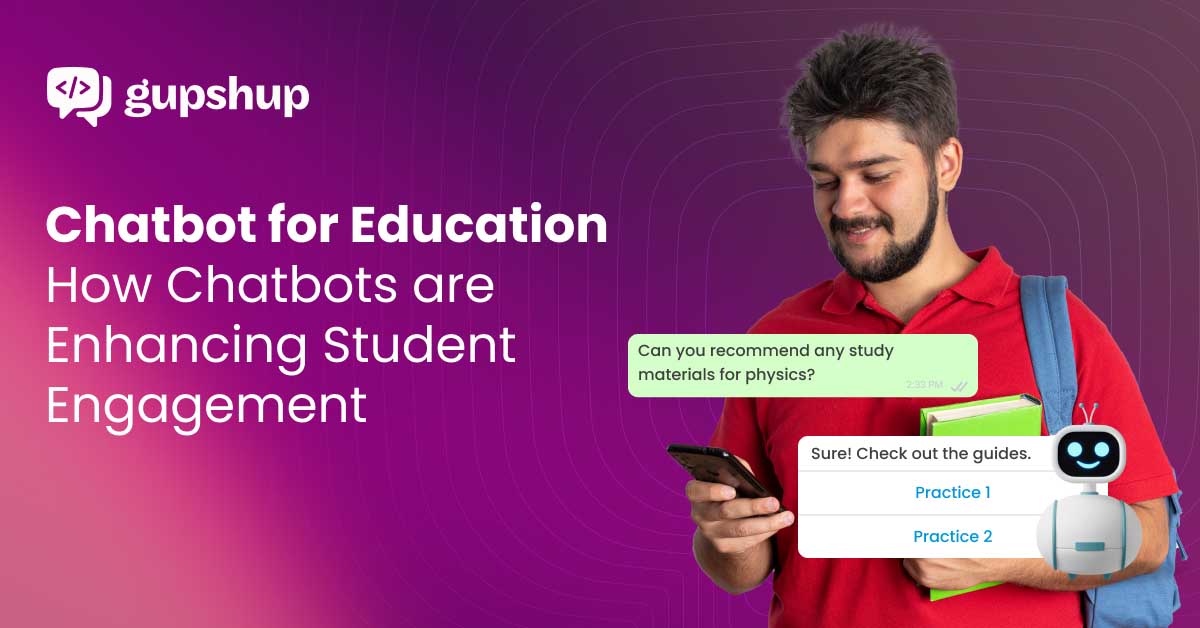Chatbot for Education: How Chatbots are Enhancing Student Engagement

Students today expect immediate answers to their questions, whether they’re typing into a search engine, asking their phone’s voice assistant, or using AI-powered study tools. They’re used to instant responses, especially when a deadline is looming.
The challenge for the education system is that these expectations don’t just apply to everyday queries. Students now expect this kind of instant support around their studies as well. They want “study partners” that are available whenever they are—be it during a late-night study session or in between classes.
This is where AI-powered study partners come into play. These tools are changing how students learn, especially when traditional help isn’t available—like during those late-night hours when every minute counts.
Schools and universities aren’t wasting any time jumping on this new trend; they’re trying to give their students a comprehensive experience, no matter where and when. In fact, by 2025, this industry is expected to be worth a whopping $1.25 billion.
However, one question still worries people: What will happen to real teachers? The thing is, chatbots aren’t replacing educators. They are an aid to teachers, like an assistant who also inspires and guides students.
To help you integrate these chatbots into the educational system, we will help you understand what a chatbot for education is and how students and teachers can use it for their benefit.

What is the Role of a Chatbot for Education?

A chatbot for education is an AI-powered tool that helps students, teachers, and staff members with learning and administrative tasks. They are essentially everywhere: on school websites, learning apps, and now even on social media. They respond to questions in real-time, guide students through tough concepts, and keep the educational process moving.
Now, you won’t have to wait for the next day to help solve a math problem; you will also have a virtual assistant to help organize your class schedule. These WhatsApp chatbots can do all of this and more. They are directly integrated into the messaging platform, and with the help of Natural Language Processing, they can understand queries and provide responses. They are made in such a way that they adapt to each person’s pace and provide personalized suggestions and feedback, helping learners better understand the study material.
How do educational chatbots work?
Chatbots role in education is more recent. These WhatsApp chatbots have become more intelligent with the growth in AI and Machine Learning capabilities. They have also become more intuitive and better at holding conversations in a more human-like manner.
Schools and universities are using these technologies for everything from answering queries to assisting with admission. With automation, these tedious processes have become faster and more efficient. They can help with:
- Answering student questions
- Explaining tough topics
- Giving reminders about assignments
- Helping teachers manage their workload
They’re available 24/7, which means students can get help anytime they need it.
Why should educational institutions adopt chatbots?
For students, chatbots for education are like tutors who are always available, no matter the time of day.
- Need help understanding a concept? The chatbot will break it down for you.
- Struggling to stay organized? It’ll remind you of deadlines and keep you on track.
These interactions between bots and students are personalized based on the individual’s learning style or academic progress.
For teachers, these AI tools take care of all time-consuming tasks like answering repetitive questions, providing resources for students based on their progress, reminding students about timely submission of the institution fees, and managing calendars with classes, quizzes, and tests! This gives the teachers enough time to connect with students on a deeper level and do what they do best – teach.
Chatbots for education have also proven to be a practical solution for education institutions and edtech platforms. These AI-driven assistants provide 24/7 support, ensuring students can get help with assignments, course details, or study materials whenever they need it. They automate tasks like handling admissions queries, guiding course registration, and managing fee reminders; chatbots free up staff time and make processes faster and more accurate. They are ideal institutions looking to support growing student numbers.
Benefits of Chatbots for Education

WhatsApp chatbots are already becoming an important part of the education system. Here are the benefits of chatbots in the education system –
Improved student engagement
Chatbots keep students engaged by providing real-time responses to their questions. Whether inside the classroom or during late-night study sessions, students can quickly access the help they need without waiting for a teacher’s availability. This instant interaction makes learning more dynamic and reduces delays in understanding concepts.
24/7 availability
One of the biggest advantages of WhatsApp chatbots is their around-the-clock accessibility. Students can access learning materials, get assignment reminders, or resolve queries any time of day. This continuous support is particularly helpful for students in different time zones or those balancing tight schedules.
Administrative efficiency
WhatsApp chatbots automate many routine tasks, such as answering FAQs about admissions, processing fee payments, scheduling, and sending reminders about deadlines. This relieves administrators and faculty of a huge load, allowing them to focus on more critical tasks that require human attention. It also improves the overall experience for students by reducing wait times for information and services.
Personalized learning experiences
Chatbots for education can tailor learning paths based on individual student needs. They can recommend specific resources, administer quizzes, and offer support based on how a student is progressing through the curriculum.
Feedback and analytics
Through chatbots, institutions can gather valuable data on student performance, engagement, and learning patterns. These insights help educators identify areas where students struggle, allowing them to adjust teaching methods or materials accordingly.
Scalability
As student populations grow, chatbots for education provide a scalable solution that human staff cannot match. Whether a class has 100 or 10,000 students, chatbots can handle multiple queries simultaneously without compromising response time or quality.
Multilingual support
With students from diverse linguistic backgrounds, WhatsApp chatbots equipped with multilingual capabilities make education more accessible. They can provide support in multiple languages, breaking down communication barriers and ensuring that students from various regions can engage with learning materials comfortably.
Use Cases of Chatbots in Educational Settings
Here is a list of the top use cases of chatbots for education in schools and colleges –

1. Student support and guidance
WhatsApp chatbots are often the first point of contact for students seeking quick answers. They assist students by answering frequently asked questions about courses, exam schedules, deadlines, and campus activities, ensuring they receive timely help without contacting faculty.
2. Admissions and onboarding
The admissions process can be complex, with multiple steps and requirements. WhatsApp chatbots simplify this by guiding prospective students through application forms, deadlines, and document submissions, ensuring that no steps are missed.

3. Learning assistance
WhatsApp chatbots can enhance learning by providing extra resources like study guides, links to reading materials, and reminders to complete assignments. They can also help students with practice problems, making them feel more prepared for exams.
4. Classroom management
Teachers often juggle several responsibilities, from tracking attendance to managing class materials. Chatbots can assist by automating these tasks, sending reminders to students, and providing updates on class schedules and assignments.

5. Administrative tasks
Routine administrative tasks like fee payments, managing student records, and scheduling meetings can be time-consuming. WhatsApp chatbots take over these duties, reminding students and staff of key dates and procedures and minimizing human error.
6. Scalability
As student numbers grow, educational institutions can rely on chatbots for education to handle multiple queries at once, without overwhelming staff. Chatbots scale effortlessly to manage increasing interactions, ensuring consistent student support.
7. Multilingual support
For institutions with diverse student populations, chatbots equipped with multilingual capabilities can bridge communication gaps by offering support in various languages. This feature is crucial in creating an inclusive environment.

How to Choose the Right Chatbot for Your Institution

Finding the right chatbot for your school or college involves a few steps. Let’s break it down –
Make it your own
Your school is unique, and your chatbot should be too. Look for one you can adapt to your specific needs, whether it’s handling questions about your campus traditions or managing your particular course structures.
Smooth integration with existing systems
Your chatbot for education should work seamlessly with your existing systems. It needs to connect easily with your learning platforms and databases. This ensures smooth operations without creating extra work for your staff.
Room to grow
As your student body grows, your chatbot should keep up. Whether you’re dealing with hundreds or thousands of students, it should handle increased interactions without slowing down.
Smart cookies only
Opt for a chatbot with advanced features like natural language processing and machine learning. These allow it to understand context, learn from interactions, and provide more accurate and relevant responses over time.
Easy for everyone
The chatbot should be easy for everyone to use – students, faculty, and staff alike. The goal is to provide quick help without any complicated steps or confusing interfaces.
Speak your language
If your campus has a diverse population, consider a multilingual chatbot. This ensures all students can get help in their preferred language, making everyone feel included.
Why it matters: Boost both engagement and efficiency
Investing in a chatbot for education that checks all these boxes isn’t just a tech upgrade—it’s a strategic move. The right chatbot enhances student engagement through personalized support while also improving operational efficiency by automating repetitive tasks. It’s a win-win for both students and staff, making your institution more dynamic and efficient in the long run.
A great example is Khan Academy, which used Gupshup’s WhatsApp chatbot to engage with over 190 million learners globally. The chatbot provided real-time access to study materials, reminders, and quizzes, leading to a more personalized and interactive learning experience. This initiative also helped streamline communication, improving both student engagement and institutional efficiency.
Conclusion: Chatbots in Education – A Game Changer
The future of educational chatbots is set to be even more transformative as AI technology continues to advance. We can expect chatbots to play an even bigger role in personalized learning, offering students tailored learning experiences and real-time support. With advancements in AI, chatbots will become more intuitive, providing deeper insights into student performance. As institutions continue to expand and adopt digital tools, chatbots will become indispensable in creating engaging and efficient learning environments.
Ready to take your educational institution to the next level with AI-powered chatbots? Gupshup offers seamless integration, multilingual support, and customizable solutions that enhance student engagement and streamline operations.
Contact Gupshup today to implement the best chatbot solution for your institution!
FAQ
1. How might chatbots enhance students’ learning?
Chatbots boost student learning by providing real-time, personalized feedback and support. They can explain complex topics, offer tailored resources, and even adjust learning paths to suit individual needs, keeping students engaged and on track outside of classroom hours.
2. How are chatbots used in education?
In education, chatbots are used for various tasks, such as answering questions about coursework, assisting with admissions, and automating administrative duties. They can also be virtual tutors, providing study materials, quizzes, and feedback to enhance learning.
3. What features of AI in education are good examples of chatbots?
Key features of AI chatbots in education include personalized learning experiences, real-time assistance, scalability to handle growing student bodies, and multilingual support. These features make chatbots effective tools in creating more inclusive and accessible learning environments.




